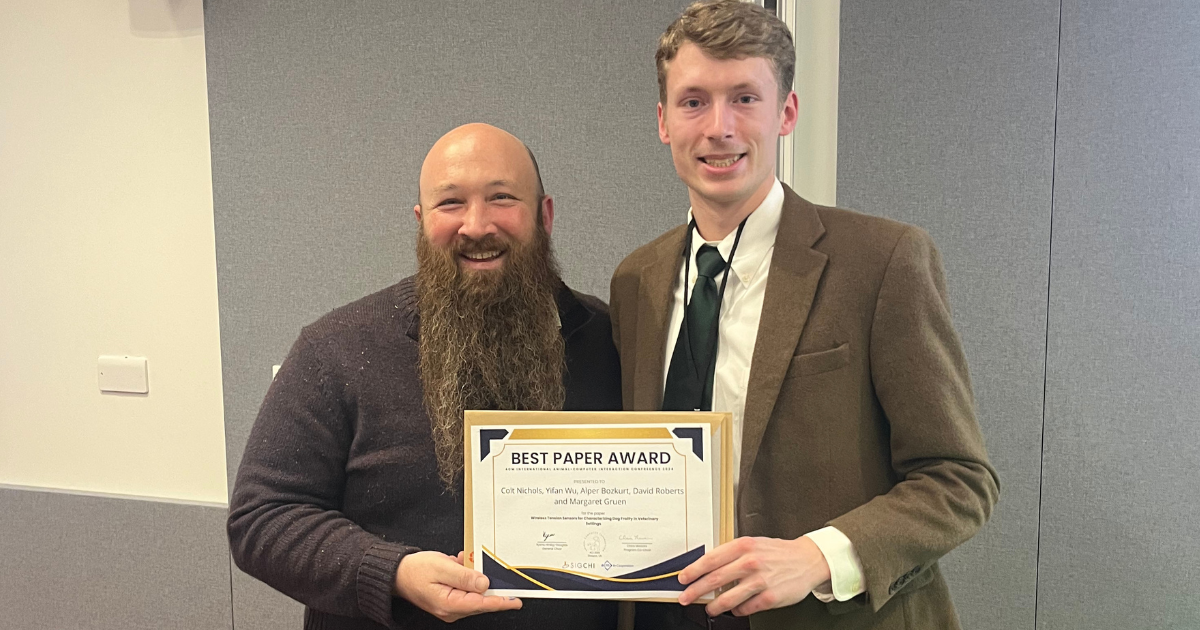
ECE Grad Student Wins Best Paper Award at ACI
ECE graduate student Colt Nichols wins best paper at the 2024 International Conference on Animal-Computer Interaction
January 9, 2025 ![]() Cara Rebackoff
Cara Rebackoff
We are thrilled to announce that the paper titled “Wireless Tension Sensors for Characterizing Dog Frailty in Veterinary Settings” has been awarded the Best Paper Award at the International Conference on Animal-Computer Interaction (ACI2024). The conference, organized by the Association for Computing Machinery (ACM), was held from December 2nd – 5th, 2024, in Glasgow, UK.
This groundbreaking work is authored by Colt Nichols, Yifan Wu, Dr. Margaret Gruen, Dr. David Roberts, and Dr. Alper Bozkurt. The lead author, ECE graduate student Colt Nichols, has been mentored by Dr. Alper Bozkurt.
About ACM
The Association for Computing Machinery (ACM) is the world’s largest computing society, bringing together computing educators, researchers, and professionals to inspire dialogue, share resources, and address the field’s challenges. ACM provides the computing field’s premier digital library and serves its members and the computing profession with leading-edge publications, conferences, and career resources.
About the Award-Winning Work
This collaborative research between the College of Veterinary Medicine and the College of Engineering falls under the umbrella of the Institute of Connected Sensor Systems (IConS) and the NSF Nanosystems Engineering Research Center for Advanced Self-Powered Systems of Integrated Sensors and Technologies (ASSIST Center). The work was inspired by veterinary professor Dr. Margaret Gruen’s need for a quantified method to assess frailty in dogs. Motivated by this need, Dr. Alper Bozkurt’s team in ECE designed a user-inspired, application-specific sensor system. The research presents a novel approach to automate frailty assessment in veterinary settings, offering promising advancements in animal healthcare.
Summary of the Research
Frailty, a concept widely studied in human gerontology, refers to the decline in physiological function due to aging, leading to vulnerability to adverse health outcomes. Translating this concept to veterinary medicine, this paper introduces an innovative system to characterize functional muscle strength—a key component of frailty in dogs—using wireless, continuous electronic sensors.
The system features custom-developed front-end hardware with real-time wireless data transfer capabilities, specifically designed for veterinary applications. It utilizes a leash-based device to measure pulling forces continuously, providing real-time monitoring via a smartphone and cloud storage for offline analysis. To complement the data, a synchronized camera records the strength performance sessions for additional insights.
Future research will focus on collecting data from a larger cohort of dogs and leveraging machine learning to integrate multimodal data and produce frailty assessment scores. The ultimate goal is to transition these assessments from veterinary environments to homes, enabling more regular and convenient data collection.
